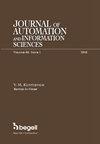MODELS AND METHODS OF INFORMATION TECHNOLOGY OF ADVANCED NEONOTAL SCREENING
Q3 Engineering
Journal of Automation and Information Sciences
Pub Date : 2021-11-01
DOI:10.34229/1028-0979-2021-6-13
引用次数: 0
Abstract
The paper considers the problems of informational implementation of neonatal screening of newborns in order to improve the overall picture of the nation's health and prevent the development of hereditary diseases. The methodology for solving the problems of complete neonatal screening is based on the methods and mathematical apparatus of discrete mathematics, web technologies, data warehouses, and data mining methods. An information model of the dynamic processes of neonatal screening is proposed, based on the specific processing of data presented by a tuple, which contains coherent sequential processes for obtaining the results of tests for blood analysis of newborns, conducting genetic studies and determining pathologies and deviations from an expanded list (currently up to 44 indicators for the purpose of exiting for more than 60). The block diagram of information support of information technology in the decision support system for carrying out neonatal screening of hereditary metabolic diseases is presented. On the basis of LLC «CDC «PHARMBIOTEST», the research of the algorithm for performing sequential procedures of neonatal screening was carried out. The described algorithm of actions has been tested and fully tested for the continuity of information flows, the stability of the information model graph. As a result of the research, the sufficiency and completeness of the chronological indicators of the processing of information flows have been proved. The criteria for confirming the authenticity of methods for obtaining a diagnosis have been developed.新生儿高级筛查的信息技术模型与方法
本文考虑了新生儿筛查信息化实施的问题,以提高国民健康的整体水平,防止遗传性疾病的发展。解决新生儿完全筛查问题的方法基于离散数学、网络技术、数据仓库和数据挖掘方法的方法和数学装置。基于元组提供的数据的具体处理,提出了新生儿筛查动态过程的信息模型,该模型包含用于获得新生儿血液分析测试结果的连贯序列过程,进行基因研究,并从扩大的列表中确定病理和偏差(目前多达44个指标,用于退出60个以上)。介绍了遗传代谢性疾病新生儿筛查决策支持系统中信息技术的信息支持框图。在LLC«CDC«PHARMBIOTEST»的基础上,对新生儿筛查的顺序程序算法进行了研究。所描述的动作算法已经过测试,并充分测试了信息流的连续性、信息模型图的稳定性。研究结果证明了信息流处理时序指标的充分性和完整性。已经制定了用于确认获得诊断的方法的真实性的标准。
本文章由计算机程序翻译,如有差异,请以英文原文为准。
求助全文
约1分钟内获得全文
求助全文
来源期刊

Journal of Automation and Information Sciences
AUTOMATION & CONTROL SYSTEMS-
自引率
0.00%
发文量
0
审稿时长
6-12 weeks
期刊介绍:
This journal contains translations of papers from the Russian-language bimonthly "Mezhdunarodnyi nauchno-tekhnicheskiy zhurnal "Problemy upravleniya i informatiki". Subjects covered include information sciences such as pattern recognition, forecasting, identification and evaluation of complex systems, information security, fault diagnosis and reliability. In addition, the journal also deals with such automation subjects as adaptive, stochastic and optimal control, control and identification under uncertainty, robotics, and applications of user-friendly computers in management of economic, industrial, biological, and medical systems. The Journal of Automation and Information Sciences will appeal to professionals in control systems, communications, computers, engineering in biology and medicine, instrumentation and measurement, and those interested in the social implications of technology.
 求助内容:
求助内容: 应助结果提醒方式:
应助结果提醒方式:


